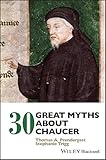30 great myths about Chaucer / Thomas A. Prendergast, Stephanie Trigg.
By: Prendergast, Thomas A [author]
Contributor(s): Trigg, Stephanie [author]
Language: English Publisher: Hoboken, NJ: John Wiley & Sons, Inc., ©2020Description: 1 online resource (232 pages)Content type: text Media type: computer Carrier type: online resourceISBN: 9781119194088Other title: Thirty great myths about ChaucerSubject(s): Chaucer, Geoffrey, 1400 | Chaucer, Geoffrey, 1400 -- Criticism and interpretationGenre/Form: Electronic books.DDC classification: 821.1 Online resources: Full text available at Wiley Online Library Click here to view| Item type | Current location | Home library | Call number | Status | Date due | Barcode | Item holds |
|---|---|---|---|---|---|---|---|
 EBOOK
EBOOK
|
COLLEGE LIBRARY | COLLEGE LIBRARY | 821.1 P9182 2020 (Browse shelf) | Available | CL-51154 |
ABOUT THE AUTHOR
Thomas A. Prendergast is Professor of English at the College of Wooster, USA. He is the author of Poetical Dust: Poets' Corner and the Making of Britain, co-author of Affective Medievalism: Love, Abjection and Discontent and co-editor of Chaucer and the Subversion of Form.
Stephanie Trigg is Redmond Barry Distinguished Professor of English Literature at the University of Melbourne, Australia. She is author of Shame and Honor: A Vulgar History of the Order of the Garter and co-author of Affective Medievalism: Love, Abjection and Discontent.
Introduction: Mythical Chaucer --
Chaucer is the father of English literature --
Chaucer was the first English poet --
Chaucer suffered an unrequited love --
Chaucer's marriage was unhappy --
Chaucer's son Thomas was John of Gaunt's bastard --
Chaucer's language is too difficult for modern readers --
The Canterbury pilgrims represent all social classes and character types --
The Canterbury pilgrims are based on real people --
The Canterbury pilgrims form a "merry company" --
Chaucer was a feminist --
Chaucer was guilty of rape --
Chaucer had a falling out with his best friend --
Chaucer lived in the Middle Ages --
Chaucer was a proto-Protestant --
Chaucer was antisemitic --
Chaucer was a spy --
Chaucer was a crook --
Chaucer was a political opportunist --
The Wife of Bath murdered her husbands --
Chaucer "outs" the Pardoner --
Chaucer never finished the Canterbury Tales --
Chaucer is obscene --
Chaucer was skeptical of chivalry --
Chaucer described himself in his works --
Chaucer wrote the first psychological novel in English --
Chaucer was in danger of being thrown in debtor's prison --
Chaucer renounced his works on his deathbed --
Chaucer is buried in his own tomb --
Chaucer was the first poet laureate --
Contemporary literary theory is irrelevant to Chaucer.
The facts and fictions that continue to shape our understanding of Chaucer and his place in literary tradition
Is Chaucer the father of English literature? The first English poet? Was he a feminist? A political opportunist? A spy? Is Chaucer’s language too difficult for modern readers? 30 Great Myths about Chaucer explores the widely held ideas and opinions about the medieval poet, discussing how ‘myths’ have influenced Chaucer’s reception history and interpretations of his poetry through the centuries.
This unique text offers original insights on the character of Chaucer, the nature of his works, the myths that inform our conceptions of Chaucer, and the underlying causes of these myths. Each accessible and engaging chapter focuses on a specific myth, including those surrounding Chaucer’s romantic life, political leanings, religious views, personal struggles, financial challenges, ideas about chivalry, representations of social class, and many others. More than simply correcting inaccurate facts or clarifying common misconceptions about Chaucer, the text delves deeper to address how the myths have shaped the critical interpretation and enduring literary legacy of Chaucer. This innovative volume:
Explores how generations of readers continue to shape understanding of Chaucer
Highlights the intersection of medievalism and Chaucer studies
Helps readers detach myths about Chaucer from critical readings of his works
Examines whether myths about Chaucer are based on historical fact or literary interpretation
Discusses the history of reading Chaucer in contexts of biography, criticism, and popular culture
30 Great Myths about Chaucer is an indispensable resource for academics, researchers, graduate students, upper-level undergraduates, and general readers with interest in Chaucer and early English and Middle Ages literature.

There are no comments for this item.